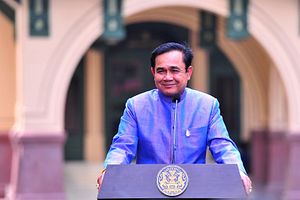Thai junta leader Prayuth Chan-o-cha will “declare war” on corruption in a high-profile speech on Monday, the Thai newspaper The Nation reported May 28.
According to the report, government representatives, foreign agencies, diplomats and the media will be invited to attend his remarks, which will also be televised live across the country. In his speech, Prayuth is expected to share his thoughts about corruption after taking over the country, the challenges he faces and how he plans to overcome them.
The focus on corruption is not new. Previous governments have vowed to address it in various ways, and Prayuth himself has made the issue one of the focus areas of his premiership. The first time he spoke on his weekly TV program “Returning Happiness to the People” in August 2014, he described corruption as “deeply-rooted in Thai society,” warning that concrete and rapid progress within a year would require cooperation from all sectors. He has also repeatedly dismissed allegations that the junta did not make corruption a separate priority in its initial reform agenda, arguing that the issue was important to address in every aspect of that agenda rather than being a standalone item.
Now, nine months later, the junta will point to several successes as demonstrations of its commitment. The government has impeached ousted prime minister Yingluck Shinawatra for a rice-pledging scheme that it says reeks of corruption. Efforts are also underway by government agencies to compile lists of corrupt officials for punishment and restructure state officials’ salary base to reduce bribery. A number of areas have been targeted as part of the junta’s corruption crackdown, including beach resorts, land sales and even lottery traders.
But the junta has also bumped up against some significant challenges. In September of last year, a minister in the prime minister’s office was embroiled in an embarrassing corruption scandal, a vivid demonstration that graft is as much a problem under the generals just as it was under the politicians. Some critical institutions where reform is badly needed – such as the police – have seen some increased scrutiny but not nearly enough. And over the past few months, whatever progress has been made on corruption in the aforementioned areas has been largely overshadowed by a widening human trafficking scandal and slavery in Thailand’s fishing industry.
It would be unfair to blame the junta for failing to root out corruption just over a year after the coup. Corruption in Thailand is both widespread and deeply-rooted, making it difficult to weed out. Even more important, then, for Prayuth to articulate a bold plan to advance the government’s current efforts, and, more importantly, to follow through on them.

































